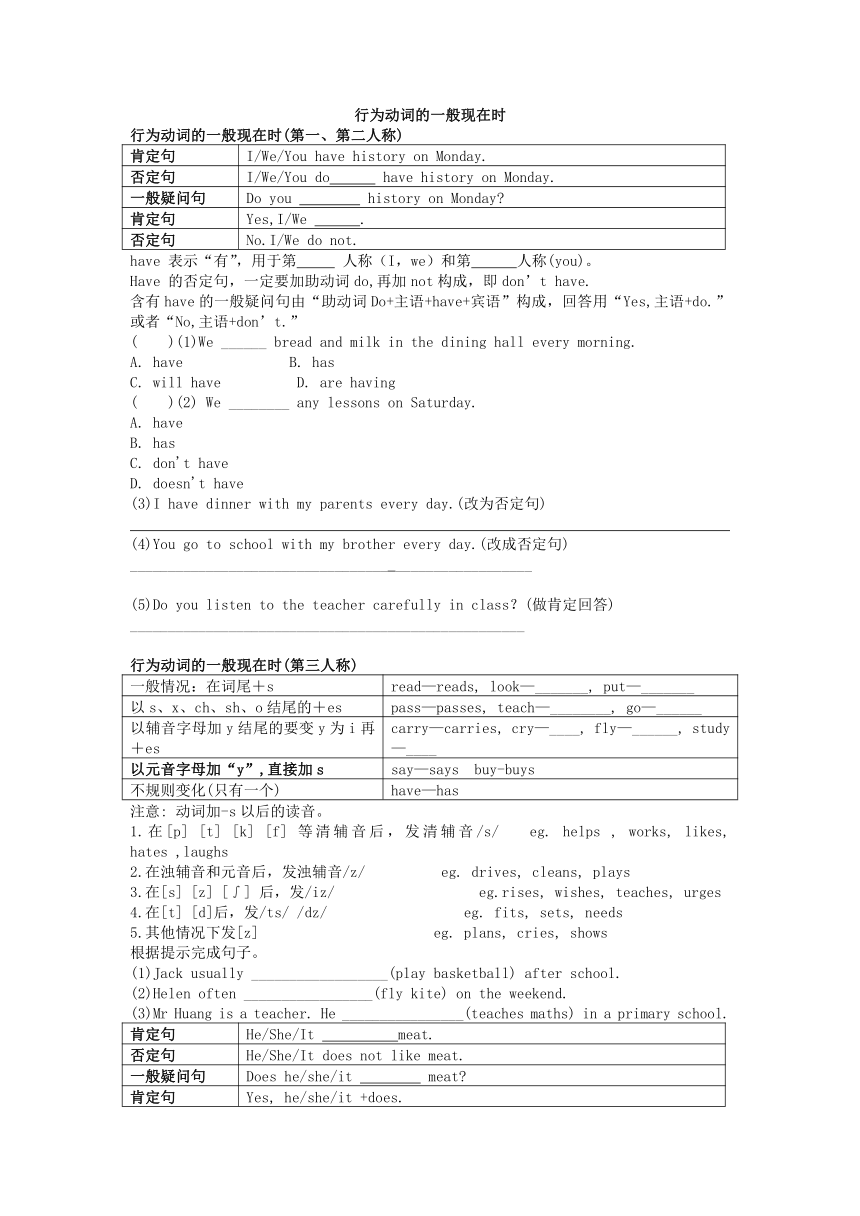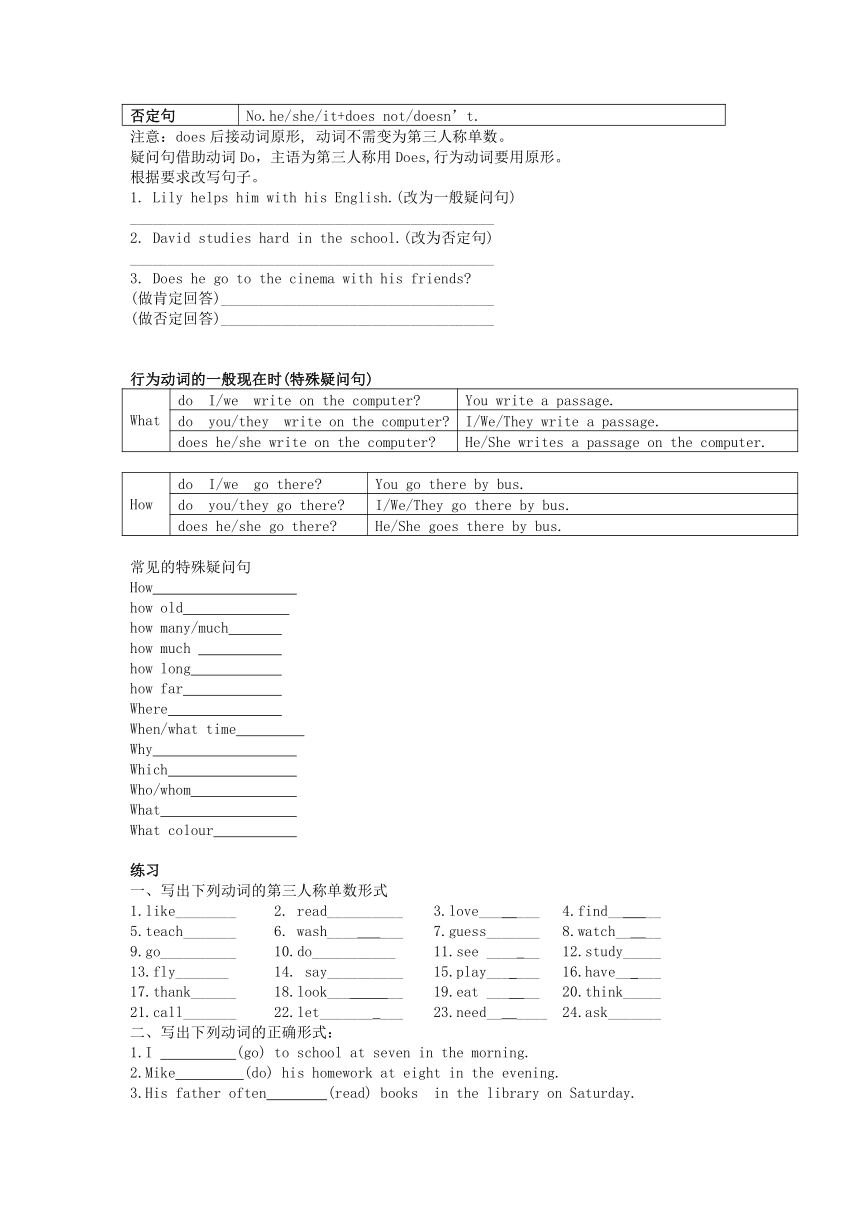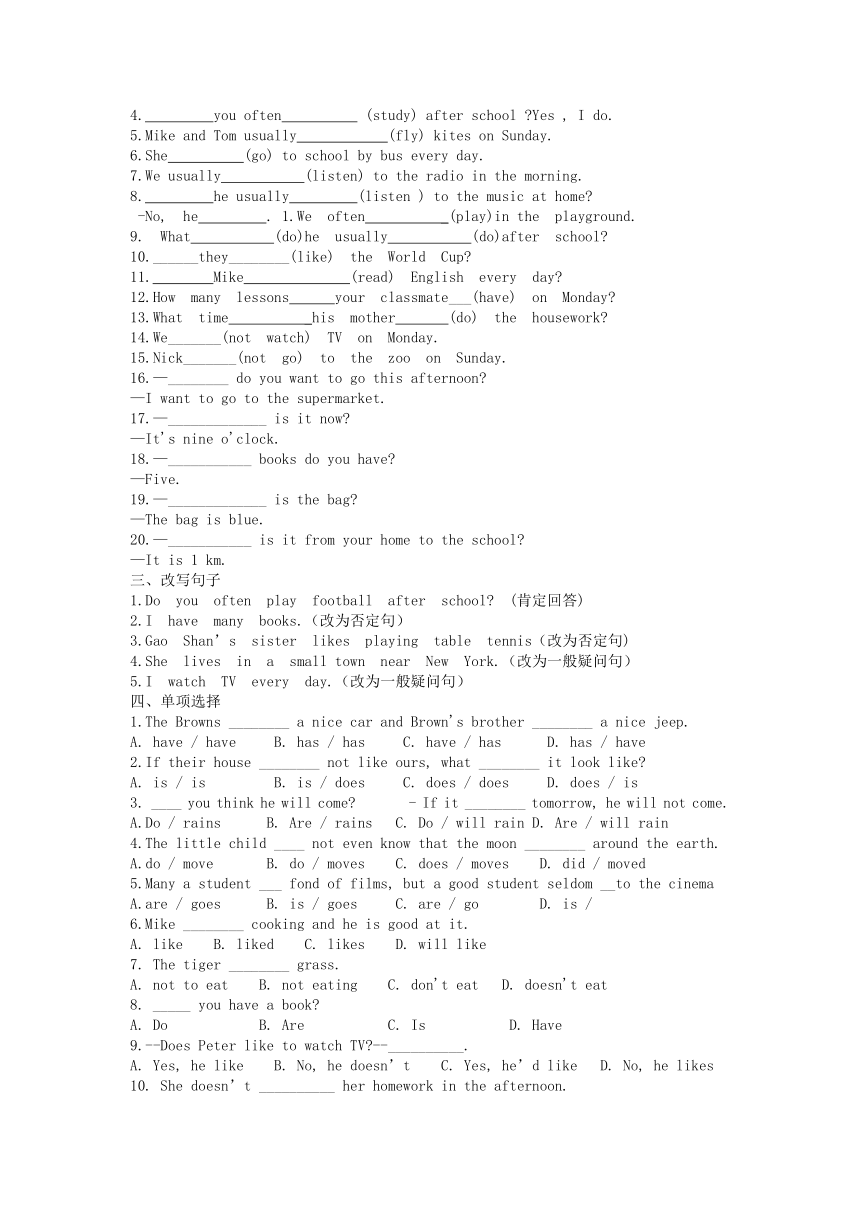行为动词的一般现在时讲解以及练习(含答案)外研版七年级英语上册
文档属性
| 名称 | 行为动词的一般现在时讲解以及练习(含答案)外研版七年级英语上册 |  | |
| 格式 | docx | ||
| 文件大小 | 29.2KB | ||
| 资源类型 | 教案 | ||
| 版本资源 | 外研版 | ||
| 科目 | 英语 | ||
| 更新时间 | 2023-11-28 10:33:30 | ||
图片预览



文档简介
行为动词的一般现在时
行为动词的一般现在时(第一、第二人称)
肯定句 I/We/You have history on Monday.
否定句 I/We/You do have history on Monday.
一般疑问句 Do you history on Monday
肯定句 Yes,I/We .
否定句 No.I/We do not.
have 表示“有”,用于第 人称(I,we)和第 人称(you)。
Have 的否定句,一定要加助动词do,再加not构成,即don’t have.
含有have的一般疑问句由“助动词Do+主语+have+宾语”构成,回答用“Yes,主语+do.”或者“No,主语+don’t.”
( )(1)We ______ bread and milk in the dining hall every morning.
A. have B. has
C. will have D. are having
( )(2) We ________ any lessons on Saturday.
A. have
B. has
C. don't have
D. doesn't have
(3)I have dinner with my parents every day.(改为否定句)
(4)You go to school with my brother every day.(改成否定句)
__________________________________ __________________
(5)Do you listen to the teacher carefully in class?(做肯定回答)
____________________________________________________
行为动词的一般现在时(第三人称)
一般情况:在词尾+s read—reads, look—_______, put—_______
以s、x、ch、sh、o结尾的+es pass—passes, teach—________, go—______
以辅音字母加y结尾的要变y为i再+es carry—carries, cry—____, fly—______, study—____
以元音字母加“y”,直接加s say—says buy-buys
不规则变化(只有一个) have—has
注意: 动词加-s以后的读音。
1.在[p] [t] [k] [f] 等清辅音后,发清辅音/s/ eg. helps , works, likes, hates ,laughs
2.在浊辅音和元音后,发浊辅音/z/ eg. drives, cleans, plays
3.在[s] [z] [∫] 后,发/iz/ eg.rises, wishes, teaches, urges
4.在[t] [d]后,发/ts/ /dz/ eg. fits, sets, needs
5.其他情况下发[z] eg. plans, cries, shows
根据提示完成句子。
(1)Jack usually __________________(play basketball) after school.
(2)Helen often _________________(fly kite) on the weekend.
(3)Mr Huang is a teacher. He ________________(teaches maths) in a primary school.
肯定句 He/She/It meat.
否定句 He/She/It does not like meat.
一般疑问句 Does he/she/it meat
肯定句 Yes, he/she/it +does.
否定句 No.he/she/it+does not/doesn’t.
注意:does后接动词原形, 动词不需变为第三人称单数。
疑问句借助动词Do,主语为第三人称用Does,行为动词要用原形。
根据要求改写句子。
1. Lily helps him with his English.(改为一般疑问句)
________________________________________________
2. David studies hard in the school.(改为否定句)
________________________________________________
3. Does he go to the cinema with his friends
(做肯定回答)____________________________________
(做否定回答)____________________________________
行为动词的一般现在时(特殊疑问句)
What do I/we write on the computer You write a passage.
do you/they write on the computer I/We/They write a passage.
does he/she write on the computer He/She writes a passage on the computer.
How do I/we go there You go there by bus.
do you/they go there I/We/They go there by bus.
does he/she go there He/She goes there by bus.
常见的特殊疑问句
How
how old
how many/much
how much
how long
how far
Where
When/what time
Why
Which
Who/whom
What
What colour
练习
一、写出下列动词的第三人称单数形式
1.like________ 2. read__________ 3.love___ ___ 4.find__ __
5.teach_______ 6. wash____ ___ 7.guess_______ 8.watch__ __
9.go__________ 10.do___________ 11.see ____ __ 12.study_____
13.fly_______ 14. say__________ 15.play___ ___ 16.have__ ___
17.thank______ 18.look___ __ 19.eat ___ __ 20.think_____
21.call_______ 22.let_______ ___ 23.need__ ____ 24.ask_______
二、写出下列动词的正确形式:
1.I (go) to school at seven in the morning.
2.Mike (do) his homework at eight in the evening.
3.His father often (read) books in the library on Saturday.
4. you often (study) after school Yes , I do.
5.Mike and Tom usually (fly) kites on Sunday.
6.She (go) to school by bus every day.
7.We usually (listen) to the radio in the morning.
8. he usually (listen ) to the music at home
-No, he . 1.We often _(play)in the playground.
9. What (do)he usually (do)after school
10.______they________(like) the World Cup
11. Mike (read) English every day
12.How many lessons your classmate___(have) on Monday
13.What time _his mother (do) the housework
14.We_______(not watch) TV on Monday.
15.Nick_______(not go) to the zoo on Sunday.
16.—________ do you want to go this afternoon
—I want to go to the supermarket.
17.—_____________ is it now
—It's nine o'clock.
18.—___________ books do you have
—Five.
19.—_____________ is the bag
—The bag is blue.
20.—___________ is it from your home to the school
—It is 1 km.
三、改写句子
1.Do you often play football after school (肯定回答)
2.I have many books.(改为否定句)
3.Gao Shan’s sister likes playing table tennis(改为否定句)
4.She lives in a small town near New York.(改为一般疑问句)
5.I watch TV every day.(改为一般疑问句)
四、单项选择
1.The Browns ________ a nice car and Brown's brother ________ a nice jeep.
A. have / have B. has / has C. have / has D. has / have
2.If their house ________ not like ours, what ________ it look like
A. is / is B. is / does C. does / does D. does / is
3. ____ you think he will come - If it ________ tomorrow, he will not come.
A.Do / rains B. Are / rains C. Do / will rain D. Are / will rain
4.The little child ____ not even know that the moon ________ around the earth.
A.do / move B. do / moves C. does / moves D. did / moved
5.Many a student ___ fond of films, but a good student seldom __to the cinema
A.are / goes B. is / goes C. are / go D. is /
6.Mike ________ cooking and he is good at it.
A. like B. liked C. likes D. will like
7. The tiger ________ grass.
A. not to eat B. not eating C. don't eat D. doesn't eat
8. _____ you have a book
A. Do B. Are C. Is D. Have
9.--Does Peter like to watch TV --__________.
A. Yes, he like B. No, he doesn’t C. Yes, he’d like D. No, he likes
10. She doesn’t __________ her homework in the afternoon.
A. doing B. to do C. does D. do
11. How ____________ Mr. Brown ___________ to America
A. do, go B. is, go C. does, go D. do, goes
12.Where’s my camera I____________ it.
A. am not finding B. am not seeing C. can’t find D. can’t look at
13.How ___________ he go to work He ___________ to work by bike.
A. does; go B. do; goes C. do; go D. does; goes
14._____ she _____ home at six every day
A.Is, leave B. Does, leave C. Is, leaves D. Does, left
15.Mr. Yang ____________ English this term.
A. teaches our B. teaches us C. teach us D. teach our
16.—________ do Alex and his sister ________ to school
—They go to school on foot.
A. When; go B. When; goes C. How; go D. How; goes
17. —________ do you save the document
—Click “save” and write a name for it.
A. Where B. When C. What D. How
18. —________ do the students ________ science class
—In that building.
A. What; have B. How; has C. When; having D. Where; have
答案:
行为动词的一般现在时(第一、第二人称)
肯定句 I/We/You have history on Monday.
否定句 I/We/You do not have history on Monday.
一般疑问句 Do you have history on Monday
肯定句 Yes,I/We do .
否定句 No.I/We do not.
have 表示“有”,用于第 一 人称(I,we)和第 二 人称(you)。
Have 的否定句,一定要加助动词do,再加not构成,即don’t have.
含有have的一般疑问句由“助动词Do+主语+have+宾语”构成,回答用“Yes,主语+do.”或者“No,主语+don’t.”
( A )(1)We ______ bread and milk in the dining hall every morning.
A. have B. has
C. will have D. are having
( C )(2) We ________ any lessons on Saturday.
A. have B. has C. don't have D. doesn't have
(3)I have dinner with my parents every day.(改为否定句)
I don’t have dinner with my parents every day.
(4)You go to school with my brother every day.(改成否定句)
___You don’t go to school with my brother every day.__________________
(5)Do you listen to the teacher carefully in class?(做肯定回答)
___Yes,I do_________________________________________________
行为动词的一般现在时(第三人称)
一般情况:在词尾+s read—reads, look—_looks_, put—__puts_
以s、x、ch、sh、o结尾的+es pass—passes, teach—teaches_, go—__goes___
以辅音字母加y结尾的要变y为i再+es carry—carries, cry—_cries, fly—__flies_, study—__studies__
以元音字母加“y”,直接加s say—says buy-buys
不规则变化(只有一个) have—has
注意: 动词加-s以后的读音。
1.在[p] [t] [k] [f] 等清辅音后,发清辅音/s/ eg. helps , works, likes, hates
2.在浊辅音和元音后,发浊辅音/z/ eg. drives, cleans, plays
3.在[s] [z] [∫] 后,发/iz/ eg.rises, wishes, teaches, urges
4.在[t] [d]后,发 /ts/ /dz/ eg. fits, sets, needs
5. 其他情况下发[z] eg. plans, cries, shows
根据提示完成句子。
(1)Jack usually ___plays_basketball___(play basketball) after school.
(2)Helen often ___flies_kites/flies_a kite_____(fly kite) on the weekend.
(3)Mr Huang is a teacher. He __teaches_maths__(teaches maths) in a primary school.
肯定句 He/She/It likes meat.
否定句 He/She/It does not like meat.
一般疑问句 Does he/she/it like meat
肯定句 Yes, he/she/it +does.
否定句 No.he/she/it+does not/doesn’t.
注意:does后接动词原形, 动词不需变为第三人称单数。
疑问句借助动词Do,主语为第三人称用Does,行为动词要用原形。
根据要求改写句子。
1. Lily helps him with his English.(改为一般疑问句)
____Does_Lily helps him with his English ____________
2. David studies hard in the school.(改为否定句)
____David doesn’t study hard in the school._ _
3. Does he go to the cinema with his friends
(做肯定回答)____Yes,he does________________________________
(做否定回答)____No,he doesn’t.____________________________
常见的特殊疑问句
How 如何
how old 年龄
how many/much 数量
how much 价格
how long 长度
how far 距离
Where 地点
When/what time 时间
Why 原因
Which 哪一个
Who/whom 谁/谁的
What 什么
What colour 颜色
练习答案
一、写出下列动词的第三人称单数形式
1.likes 2.reads 3.loves 4.finds 5.teaches 6.washes 7.guesses 8.watches 9.goes 10.does 11.sees 12.studies 13.files 14.says
15.plays 16. has 17.thanks 18.looks 19. eats 20.thinks 21.calls
22.lets 23.needs 24.asks
二、写出下列动词的正确形式:
1.go 2.does 3.reads 4.Do;study 5.fly 6.goes 7.listen 8.Does;listen;doesn’t;play 9.does;do
10.Do;like 11.Does;read 12.do;have 13.does;do
14.don’t watch 15.doesn’t go 16.Where 17.What time/When
18.How many 19.What colour 20.How far
三、改写句子
1.Yes,I do.
2.I don’t have many books.
3.Gao Shan’s sister doesn’t like playing table tennis.
4.Does she live in a small town near New York.
5.Do you watch TV every day.
四、单项选择
1.C 2.C 3.A 4.B 5.B 6.C 7.D 8.A 9.B 10.D 11.C
12.C 13.D 14.B 15.B 16.C 17.D 18.D
行为动词的一般现在时(第一、第二人称)
肯定句 I/We/You have history on Monday.
否定句 I/We/You do have history on Monday.
一般疑问句 Do you history on Monday
肯定句 Yes,I/We .
否定句 No.I/We do not.
have 表示“有”,用于第 人称(I,we)和第 人称(you)。
Have 的否定句,一定要加助动词do,再加not构成,即don’t have.
含有have的一般疑问句由“助动词Do+主语+have+宾语”构成,回答用“Yes,主语+do.”或者“No,主语+don’t.”
( )(1)We ______ bread and milk in the dining hall every morning.
A. have B. has
C. will have D. are having
( )(2) We ________ any lessons on Saturday.
A. have
B. has
C. don't have
D. doesn't have
(3)I have dinner with my parents every day.(改为否定句)
(4)You go to school with my brother every day.(改成否定句)
__________________________________ __________________
(5)Do you listen to the teacher carefully in class?(做肯定回答)
____________________________________________________
行为动词的一般现在时(第三人称)
一般情况:在词尾+s read—reads, look—_______, put—_______
以s、x、ch、sh、o结尾的+es pass—passes, teach—________, go—______
以辅音字母加y结尾的要变y为i再+es carry—carries, cry—____, fly—______, study—____
以元音字母加“y”,直接加s say—says buy-buys
不规则变化(只有一个) have—has
注意: 动词加-s以后的读音。
1.在[p] [t] [k] [f] 等清辅音后,发清辅音/s/ eg. helps , works, likes, hates ,laughs
2.在浊辅音和元音后,发浊辅音/z/ eg. drives, cleans, plays
3.在[s] [z] [∫] 后,发/iz/ eg.rises, wishes, teaches, urges
4.在[t] [d]后,发/ts/ /dz/ eg. fits, sets, needs
5.其他情况下发[z] eg. plans, cries, shows
根据提示完成句子。
(1)Jack usually __________________(play basketball) after school.
(2)Helen often _________________(fly kite) on the weekend.
(3)Mr Huang is a teacher. He ________________(teaches maths) in a primary school.
肯定句 He/She/It meat.
否定句 He/She/It does not like meat.
一般疑问句 Does he/she/it meat
肯定句 Yes, he/she/it +does.
否定句 No.he/she/it+does not/doesn’t.
注意:does后接动词原形, 动词不需变为第三人称单数。
疑问句借助动词Do,主语为第三人称用Does,行为动词要用原形。
根据要求改写句子。
1. Lily helps him with his English.(改为一般疑问句)
________________________________________________
2. David studies hard in the school.(改为否定句)
________________________________________________
3. Does he go to the cinema with his friends
(做肯定回答)____________________________________
(做否定回答)____________________________________
行为动词的一般现在时(特殊疑问句)
What do I/we write on the computer You write a passage.
do you/they write on the computer I/We/They write a passage.
does he/she write on the computer He/She writes a passage on the computer.
How do I/we go there You go there by bus.
do you/they go there I/We/They go there by bus.
does he/she go there He/She goes there by bus.
常见的特殊疑问句
How
how old
how many/much
how much
how long
how far
Where
When/what time
Why
Which
Who/whom
What
What colour
练习
一、写出下列动词的第三人称单数形式
1.like________ 2. read__________ 3.love___ ___ 4.find__ __
5.teach_______ 6. wash____ ___ 7.guess_______ 8.watch__ __
9.go__________ 10.do___________ 11.see ____ __ 12.study_____
13.fly_______ 14. say__________ 15.play___ ___ 16.have__ ___
17.thank______ 18.look___ __ 19.eat ___ __ 20.think_____
21.call_______ 22.let_______ ___ 23.need__ ____ 24.ask_______
二、写出下列动词的正确形式:
1.I (go) to school at seven in the morning.
2.Mike (do) his homework at eight in the evening.
3.His father often (read) books in the library on Saturday.
4. you often (study) after school Yes , I do.
5.Mike and Tom usually (fly) kites on Sunday.
6.She (go) to school by bus every day.
7.We usually (listen) to the radio in the morning.
8. he usually (listen ) to the music at home
-No, he . 1.We often _(play)in the playground.
9. What (do)he usually (do)after school
10.______they________(like) the World Cup
11. Mike (read) English every day
12.How many lessons your classmate___(have) on Monday
13.What time _his mother (do) the housework
14.We_______(not watch) TV on Monday.
15.Nick_______(not go) to the zoo on Sunday.
16.—________ do you want to go this afternoon
—I want to go to the supermarket.
17.—_____________ is it now
—It's nine o'clock.
18.—___________ books do you have
—Five.
19.—_____________ is the bag
—The bag is blue.
20.—___________ is it from your home to the school
—It is 1 km.
三、改写句子
1.Do you often play football after school (肯定回答)
2.I have many books.(改为否定句)
3.Gao Shan’s sister likes playing table tennis(改为否定句)
4.She lives in a small town near New York.(改为一般疑问句)
5.I watch TV every day.(改为一般疑问句)
四、单项选择
1.The Browns ________ a nice car and Brown's brother ________ a nice jeep.
A. have / have B. has / has C. have / has D. has / have
2.If their house ________ not like ours, what ________ it look like
A. is / is B. is / does C. does / does D. does / is
3. ____ you think he will come - If it ________ tomorrow, he will not come.
A.Do / rains B. Are / rains C. Do / will rain D. Are / will rain
4.The little child ____ not even know that the moon ________ around the earth.
A.do / move B. do / moves C. does / moves D. did / moved
5.Many a student ___ fond of films, but a good student seldom __to the cinema
A.are / goes B. is / goes C. are / go D. is /
6.Mike ________ cooking and he is good at it.
A. like B. liked C. likes D. will like
7. The tiger ________ grass.
A. not to eat B. not eating C. don't eat D. doesn't eat
8. _____ you have a book
A. Do B. Are C. Is D. Have
9.--Does Peter like to watch TV --__________.
A. Yes, he like B. No, he doesn’t C. Yes, he’d like D. No, he likes
10. She doesn’t __________ her homework in the afternoon.
A. doing B. to do C. does D. do
11. How ____________ Mr. Brown ___________ to America
A. do, go B. is, go C. does, go D. do, goes
12.Where’s my camera I____________ it.
A. am not finding B. am not seeing C. can’t find D. can’t look at
13.How ___________ he go to work He ___________ to work by bike.
A. does; go B. do; goes C. do; go D. does; goes
14._____ she _____ home at six every day
A.Is, leave B. Does, leave C. Is, leaves D. Does, left
15.Mr. Yang ____________ English this term.
A. teaches our B. teaches us C. teach us D. teach our
16.—________ do Alex and his sister ________ to school
—They go to school on foot.
A. When; go B. When; goes C. How; go D. How; goes
17. —________ do you save the document
—Click “save” and write a name for it.
A. Where B. When C. What D. How
18. —________ do the students ________ science class
—In that building.
A. What; have B. How; has C. When; having D. Where; have
答案:
行为动词的一般现在时(第一、第二人称)
肯定句 I/We/You have history on Monday.
否定句 I/We/You do not have history on Monday.
一般疑问句 Do you have history on Monday
肯定句 Yes,I/We do .
否定句 No.I/We do not.
have 表示“有”,用于第 一 人称(I,we)和第 二 人称(you)。
Have 的否定句,一定要加助动词do,再加not构成,即don’t have.
含有have的一般疑问句由“助动词Do+主语+have+宾语”构成,回答用“Yes,主语+do.”或者“No,主语+don’t.”
( A )(1)We ______ bread and milk in the dining hall every morning.
A. have B. has
C. will have D. are having
( C )(2) We ________ any lessons on Saturday.
A. have B. has C. don't have D. doesn't have
(3)I have dinner with my parents every day.(改为否定句)
I don’t have dinner with my parents every day.
(4)You go to school with my brother every day.(改成否定句)
___You don’t go to school with my brother every day.__________________
(5)Do you listen to the teacher carefully in class?(做肯定回答)
___Yes,I do_________________________________________________
行为动词的一般现在时(第三人称)
一般情况:在词尾+s read—reads, look—_looks_, put—__puts_
以s、x、ch、sh、o结尾的+es pass—passes, teach—teaches_, go—__goes___
以辅音字母加y结尾的要变y为i再+es carry—carries, cry—_cries, fly—__flies_, study—__studies__
以元音字母加“y”,直接加s say—says buy-buys
不规则变化(只有一个) have—has
注意: 动词加-s以后的读音。
1.在[p] [t] [k] [f] 等清辅音后,发清辅音/s/ eg. helps , works, likes, hates
2.在浊辅音和元音后,发浊辅音/z/ eg. drives, cleans, plays
3.在[s] [z] [∫] 后,发/iz/ eg.rises, wishes, teaches, urges
4.在[t] [d]后,发 /ts/ /dz/ eg. fits, sets, needs
5. 其他情况下发[z] eg. plans, cries, shows
根据提示完成句子。
(1)Jack usually ___plays_basketball___(play basketball) after school.
(2)Helen often ___flies_kites/flies_a kite_____(fly kite) on the weekend.
(3)Mr Huang is a teacher. He __teaches_maths__(teaches maths) in a primary school.
肯定句 He/She/It likes meat.
否定句 He/She/It does not like meat.
一般疑问句 Does he/she/it like meat
肯定句 Yes, he/she/it +does.
否定句 No.he/she/it+does not/doesn’t.
注意:does后接动词原形, 动词不需变为第三人称单数。
疑问句借助动词Do,主语为第三人称用Does,行为动词要用原形。
根据要求改写句子。
1. Lily helps him with his English.(改为一般疑问句)
____Does_Lily helps him with his English ____________
2. David studies hard in the school.(改为否定句)
____David doesn’t study hard in the school._ _
3. Does he go to the cinema with his friends
(做肯定回答)____Yes,he does________________________________
(做否定回答)____No,he doesn’t.____________________________
常见的特殊疑问句
How 如何
how old 年龄
how many/much 数量
how much 价格
how long 长度
how far 距离
Where 地点
When/what time 时间
Why 原因
Which 哪一个
Who/whom 谁/谁的
What 什么
What colour 颜色
练习答案
一、写出下列动词的第三人称单数形式
1.likes 2.reads 3.loves 4.finds 5.teaches 6.washes 7.guesses 8.watches 9.goes 10.does 11.sees 12.studies 13.files 14.says
15.plays 16. has 17.thanks 18.looks 19. eats 20.thinks 21.calls
22.lets 23.needs 24.asks
二、写出下列动词的正确形式:
1.go 2.does 3.reads 4.Do;study 5.fly 6.goes 7.listen 8.Does;listen;doesn’t;play 9.does;do
10.Do;like 11.Does;read 12.do;have 13.does;do
14.don’t watch 15.doesn’t go 16.Where 17.What time/When
18.How many 19.What colour 20.How far
三、改写句子
1.Yes,I do.
2.I don’t have many books.
3.Gao Shan’s sister doesn’t like playing table tennis.
4.Does she live in a small town near New York.
5.Do you watch TV every day.
四、单项选择
1.C 2.C 3.A 4.B 5.B 6.C 7.D 8.A 9.B 10.D 11.C
12.C 13.D 14.B 15.B 16.C 17.D 18.D
同课章节目录
